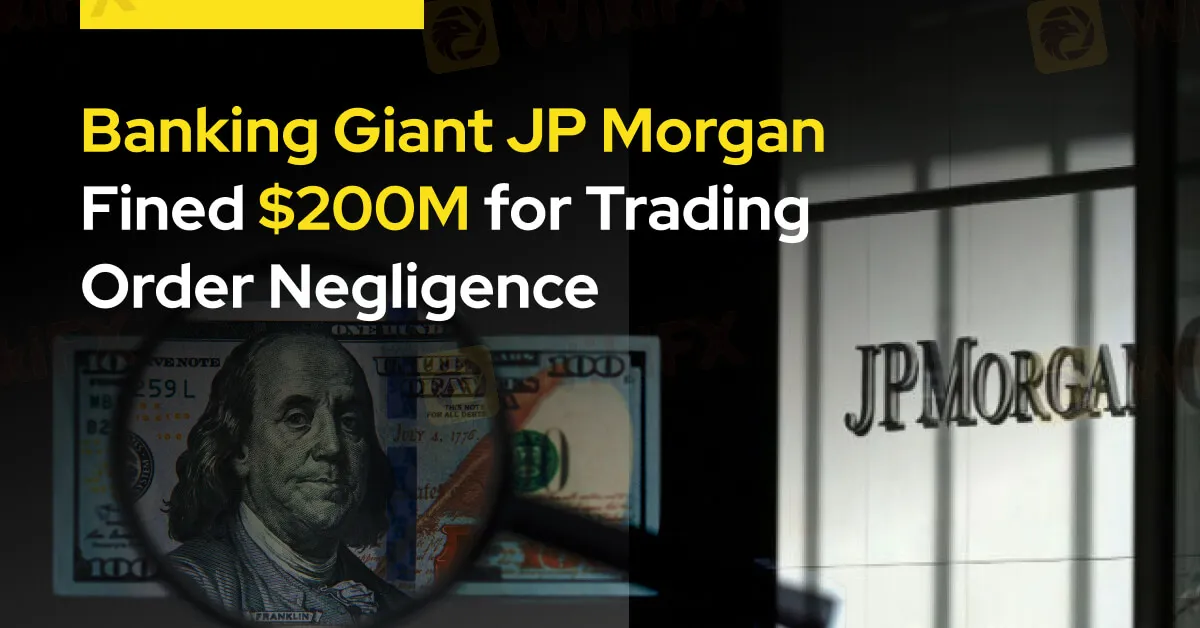简体中文
繁體中文
English
Pусский
日本語
ภาษาไทย
Tiếng Việt
Bahasa Indonesia
Español
हिन्दी
Filippiiniläinen
Français
Deutsch
Português
Türkçe
한국어
العربية
Banking Giant JP Morgan Fined $200M for Trading Order Negligence
Abstract:The Commodity Futures Trading Commission (CFTC) has settled charges against J.P. Morgan Securities LLC, a registered futures commission merchant and swap dealer, with a $200 million civil monetary penalty

The Commodity Futures Trading Commission (CFTC) has settled charges against J.P. Morgan Securities LLC, a registered futures commission merchant and swap dealer, with a $200 million civil monetary penalty. This penalty will be offset by $100 million, contingent on payments made pursuant to a related resolution with JPMorgan Chase Bank.
J.P. Morgan admitted to failing to diligently supervise its business, resulting in the failure to capture billions of orders in its surveillance systems. The CFTC emphasized that the resolution includes a significant penalty, certain factual admissions, and the appointment of a consultant to ensure remediation. The commission aims to convey a clear message that CFTC registrants must take appropriate steps to ensure, through testing and other means, that complete trade and order data direct from exchanges are being ingested into trade surveillance systems and that orders are being properly monitored.

In 2021, during the onboarding of a new trading exchange, J.P. Morgan discovered that its surveillance of trading on multiple venues and trading systems was not operating correctly. This issue resulted in substantial gaps in J.P. Morgans trade surveillance on these venues, highlighting a significant oversight in their compliance processes.
The surveillance gaps stemmed from J.P. Morgan's failure to configure certain data feeds to ensure that complete trade and order data were ingested by its surveillance tools. This technical misconfiguration led to a failure in monitoring billions of order messages over an extended period.
On a designated U.S. contract market, J.P. Morgan failed to ingest into its surveillance systems—and thus did not monitor—billions of order messages from 2014 through 2021. These unmonitored messages largely consisted of sponsored access trading activity for three significant algorithmic trading firms. J.P. Morgan has since represented that the surveillance gaps were fully remediated by 2023, addressing the compliance shortcomings identified.
Furthermore, J.P. Morgan had a quarterly reconciliation process in place to ensure the completeness of some order and trade data ingested into certain surveillance systems. However, it did not apply this process to direct-from-exchange data feeds. This oversight was based on an erroneous assumption that data directly from an exchange was a “golden source” and did not require testing. This assumption proved to be a critical error, leading to significant gaps in their surveillance capabilities.
The CFTC's resolution with J.P. Morgan underscores the critical importance of rigorous supervision and comprehensive data monitoring within financial institutions to maintain market integrity and compliance. The appointment of a consultant to oversee the remediation process is intended to ensure that such lapses do not occur in the future, reinforcing the need for continuous and thorough oversight in trading activities.
This settlement serves as a stark reminder to all CFTC registrants about the essential need for robust surveillance systems and diligent supervision practices, be it for big established firms or new budding organizations. Ensuring the completeness and accuracy of trade and order data is always fundamental to the integrity of the trading markets and the protection of investors.

Disclaimer:
The views in this article only represent the author's personal views, and do not constitute investment advice on this platform. This platform does not guarantee the accuracy, completeness and timeliness of the information in the article, and will not be liable for any loss caused by the use of or reliance on the information in the article.
Read more

The Hidden Checklist: Five Unconventional Steps to Vet Your Broker
Forex broker scams continue to evolve, employing new tactics to appear credible and mislead unsuspecting traders. Identifying these fraudulent schemes requires vigilance and strategies beyond the usual advice. Here are five effective methods to help traders assess the legitimacy of a forex broker and avoid potential pitfalls.

Doo Financial Obtains Licenses in BVI and Cayman Islands
Doo Financial, a subsidiary of Singapore-based Doo Group, has expanded its regulatory footprint by securing new offshore licenses from the British Virgin Islands Financial Services Commission (BVI FSC) and the Cayman Islands Monetary Authority (CIMA).

CFI’s New Initiative Aims to Promote Transparency in Trading
A new programme has been launched by CFI to address the growing need for transparency and awareness in online trading. Named “Trading Transparency+: Empowering Awareness and Clarity in Trading,” the initiative seeks to combat misinformation and equip individuals with resources to evaluate whether trading aligns with their financial goals and circumstances.

Malaysian-Thai Fraud Syndicate Dismantled, Millions in Losses Reported
The Royal Malaysia Police (PDRM) has received 26 reports concerning the Nicshare and CommonApps investment schemes, both linked to a major fraudulent syndicate led by a Malaysian citizen. The syndicate’s activities came to light following the arrest of its leader by Thai authorities on 16 December.
WikiFX Broker
Latest News
AIMS Broker Review
The Hidden Checklist: Five Unconventional Steps to Vet Your Broker
Russia to Fully Ban Crypto Mining in 10 Regions Starting January 1, 2025
YAMARKETS' Jingle Bells Christmas Offer!
Why is there so much exposure against PrimeX Capital?
MTrading’s 2025 "Welcome Bonus" is Here
Doo Financial Obtains Licenses in BVI and Cayman Islands
CFI’s New Initiative Aims to Promote Transparency in Trading
Currency Calculator


